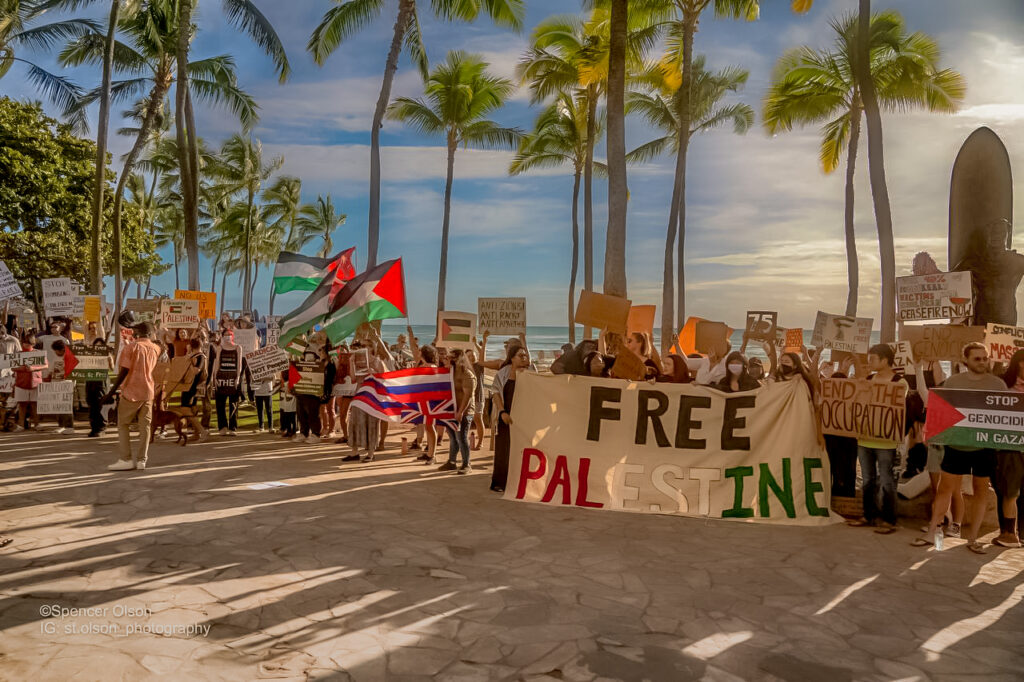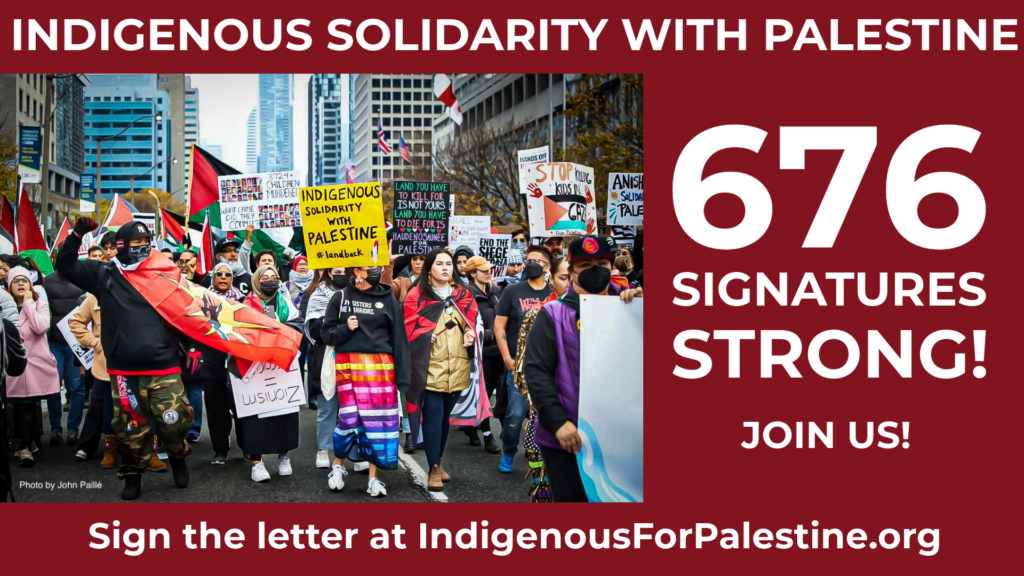Let Gaza Change You

This is a publication from the Indigenous Solidarity with Palestine website.
Photo credit: Spencer Olson
November 18, 2023
By Uahikea Maile
The essay is based on conference remarks during the American Studies Association convention in Montreal, Canada on November 4, 2023. In the middle of the roundtable—Indigenous Atmospheres and When Technology Fails—where original remarks were delivered, the speakers and most audience members walked out to join those attending the American Studies Association and Middle Eastern Studies Association conventions who demonstrated in the streets of Montreal for the International Day of Solidarity with Palestine.
###
I remember the wind, whipping with bright sun shining overhead one busy weekend in early November 2019, at the Mauna Kea blockade against the Thirty Meter Telescope on Hawaiʻi Island. Mountain breezes of Humuʻula mixed with Kānehoalani’s beaming light. It was a chilly and, at the same time, warm day at approximately 6,000 feet above sea level.
I remember sitting cross-legged on the asphalted shoulder of Mauna Kea Access Road, huddled with hundreds of kiaʻi (mountain protectors) during afternoon ceremonial protocols, of which took place every day three times a day in the middle of the road; precisely where the State of Hawaii actively criminalized Kānaka Maoli (Native Hawaiians) for protecting our sacred mountain from the desecration and destruction promised in development of the Thirty Meter Telescope. After living for the first three weeks in July 2019 at the puʻuhonua (sanctuary) established at Puʻuhuluhulu across the highway from the blockade, I returned again to be with kiaʻi and the mauna.
I remember the many formal gift offerings—the hoʻokupu—shared during these ceremonies by Kanaka Maoli (the Indigenous people of Hawaiʻi) and people from all over the world. Large and small delegations of people from Standing Rock, Tonga, Jamaica, Chile and elsewhere. Hoʻokupu given to balance relations with our kūpuna (elders) including Mauna Kea. Kiʻi (carvings). Lei (adornments). Moena (mats). Oli, mele, haʻi ʻōlelo (chants, songs, and speeches). And so much more was offered.
But the atmosphere—the social, political, economic, ecological, and religious environment as well as affective mood—in this hoʻokupu ceremony was particularly auspicious. A little over four years ago on November 2, 2019, a Palestinian delegation sauntered slowly down the road to greet kūpuna, who sat shaded under tents in the middle of the throughway constituting the main blockade.
We must not forget who stood with us to protect Mauna Kea. Kanaka Maoli are celebrated for giving abundantly, not taking selfishly. How could we possibly abandon those who gave unreservedly to us, especially when called to respond in their dire time of need?
Wearing keffiyeh peppered with olive leaf and fishnet patterns, Palestinian historian Rana Barakat and Palestinian journalist Yousef Aljamal approached. I knew who they were right away. Barakat and Aljamal were accompanied by two stalwart champions of the US Campaign for the Academic and Cultural Boycott of Israel: J. Kēhaulani Kauanui and Cynthia Franklin. I recognized them, too; two erudite thinkers and committed organizers for Hawaiʻi-Palestine solidarity. It is through their years and years of solidarity work that our communities, then and there, came into closer relationship with one another. Kauanui and Franklin introduced the Palestinian luminaries to kūpuna, kiaʻi, and Mauna Kea. The energy in the crowd was palpable.
Rana Barakat is an Associate Professor of History at Birzeit University and Director of the Birzeit University Museum in the Occupied West Bank, at an institution which on October 15, 2023 published a moving call entitled “Do Not Be Silent About Genocide” with tremendous salience: “call[ing] upon the international academic community, unions, and students to fulfill their intellectual and academic duty of seeking truth, maintaining a critical distance from state-sponsored propaganda, and to hold the perpetrators of genocide and those complicit with them accountable.” Birzeit University Union issued another moving statement that Mondoweiss published entitled “‘We are all Palestinians’ in the face of colonial fascism”. Barakat’s upcoming book is about the northern Jerusalem village Lifta and Indigenous resistance to the museumification of Palestine. Recently, she joined a virtual panel, sponsored by Jadaliyya entitled “Palestine for Hawaiʻi” as a teach-in and fundraiser for Kānaka Maoli affected by the Maui wildfires beginning on August 8, 2023. Kauanui and Franklin contributed to the panel as did Kanaka Maoli scholars and kiaʻi Kahala Johnson and Māhea Ahia, and also Palestinian anthropologist Sarah Ihmoud and Palestinian geographer Nour Joudah.
Yousef Aljamal is a prolific writer, translator, and researcher whose analysis is frequently published in Politics Today, Electronic Intifada, and elsewhere. Although we didn’t spend much time together in November 2019, Yousef routinely sends me works of his via direct message on X (formerly Twitter). On October 18, 2023, Yousef sent me his newest piece for Politics Today. In it, he discusses the loss of nine of his family members in Gaza due to Israeli air assaults. He writes: “It is important to remember that throughout history, Gaza has always risen from the ashes, and Israel’s military might will not bring it peace; treating Palestinians as equal human beings with full dignity will bring it peace.” This assertion has been haunting me amid the current Israeli siege on Gaza. How can Palestinians grieve lives lost when they, and their supporters, are now, with little to no regard for people subject to ethnic cleansing, perfunctorily asked to condemn Hamas? Occupied peoples should not be indicted through the moral and ethical indices of their occupying power.
After ceremony in Mauna Kea Access Road, all four—Franklin, Kauanui, Barakat, and Aljamal—provided public seminars at Puʻuhonua o Puʻuhuluhulu. Puʻuhonua o Puʻuhuluhulu established a University for open, accessible exchange of knowledge as a true Hawaiian place of learning. In such a truly Hawaiian place of learning, contrasting with the University of Hawaii that refers to itself as a “Hawaiian place of learning” while hawking support for the Thirty Meter Telescope, Palestinians and Kānaka Maoli talked story. Stories swapped about settler colonialism, about occupation, and about freedom dreams for liberation. It was an atmosphere of Indigenous presence and transnational connection for the shared refusal, as I have written in “On Being Late”, of technoscientific conquest as well as militarized settler state police force, surveillance, control, and terror.
The offerings, stories, and solidarities presented were generations in the making—a keffiyeh felt like a lei—attesting to the long, hard work of Indigenous internationalism, which Palestinian scholar Steven Salaita in his book Inter/Nationalism suggests “demands commitment to mutual liberation based on the proposition that colonial power must be rendered diffuse across multiple hemispheres through reciprocal struggle.”
Reflecting on his delegation to Mauna Kea in the Electronic Intifada, Yousef Aljamal posits, “When I met Kanaka Maoli, I saw them as Palestinians. I saw them as Palestinians standing up to prevent the demolition of their homes in occupied Jerusalem.” Seeing Kānaka Maoli stand up against development of the Thirty Meter Telescope, he identifies an affinity or resonance with Palestinians stopping home demolition and Zionist settlement in the Occupied West Bank. Yousef continues: “I saw them [Kānaka Maoli] as Gaza’s people continuing to participate in the Great March of Return despite all the deaths and injuries inflicted by Israel…Palestine and Hawaiʻi have similar histories.” Less an identity politics, the relationality constructed here is fundamental to comprehending and engaging Indigenous politics, and therein a complex kin relation that is mutually intelligible and likewise understood between Indigenous peoples.
From Mauna Kea to Gaza, or as Kanaka Maoli artists Kauwila Mahi and ʻIhilani Lasconia spit in Rise Up: BDS Mixtape Vol. 2 from the “Pae ‘Āina to Palestine”, Indigenous peoples subjected to illegal and belligerent military occupation seek decolonized and deoccupied futures in the cramped time-spaces of settler colonialism. We’re not the same, nor are our situations, but we can believe and trust and dream big and win and really live, in a world thoroughly wrecked by capitalism, colonialism, and imperialism, when we see ourselves in one another.
This was the environment. The mood. That biting wind and sweltering sun. Nā makana ea, the gifts of sovereignty exchanged; lei and keffiyeh. Commitments made from one lāhui (people, nation, nationhood) to another in the malu, or shade and protection, of Mauna Kea.
Building on the writing of Paiute anthropologist Kristen Simmons in “Settler Atmospherics” and “Expanse” as well as Black social justice education researcher Sefanit Habtom and Cree sociologist Megan Scribe “Breathing Together”, it was an atmosphere at Mauna Kea of co-conspiring amid the atmospheric terrors of telescopes, long range acoustic devices, state police barricades, US army national guard, bombing ranges, and more. Suspended in settler states of exception for sacrifice, we found each other from the river, across seas, and on the mountain. An enchanting climate to learn and practice breathing freedom in together.
Seeing Palestinians escape on October 7, 2023 from, what international human rights organizations like the Norwegian Refugee Council refer to as, the world’s largest open-air prison in Gaza, I still had dirt on my boots from Puʻu Kūkahauʻula at the summit of Mauna Kea. Piloting a bulldozer, Palestinian civilians widened an opening in the apartheid wall and brought down one section of the border fence near Nir Oz. “It was unbelievable. It felt surreal,” writes Palestinian journalist Mariam Barghouti in Al Jazeera, “[f]ew in the world would understand our feelings in that moment. Perhaps political prisoners might.” “In this context,” she goes on, “seeing those images and videos of the prison wall torn down in Gaza is liberating. Their symbolic power cannot be overstated.” In an interview on The Red Nation Podcast, I describe that exact moment as an expression and feeling of jubilation, in the spirit of what Barghouti lucidly speaks to, and an excited interest for what Kanaka Maoli might specifically learn from this liberation struggle and how we might stand in solidarity with Palestinians as they have with us.
That morning is a lifetime. I was reminded then of the ʻōlelo noʻeau (proverb) “kūlia i ka nuʻu” which can be interpreted as “strive for the summit.” But, these wise words in ʻōlelo Hawaiʻi (the Indigenous language of Hawaiʻi) can also be interpreted to mean striving for zeniths of freedom; the steep and treacherous yet clear-sighted heights of liberation.
It’s hard to get free. When we see it peek through, even if momentarily, how can we not respond with anything less than our full hearts and minds, clear throats and voices, and entire souls in exuberant praise?
To not respond as such might manifest through an inability or unwillingness to really see the subjugation of conquest—those conditions of domination produced through extremely asymmetrical relations of power in Israel/Palestine—and perhaps is furthermore a product of the customarily revered western liberal democratic freedom violently guarded globally. Liberation is the goal, not liberalism.
As Kanaka Maoli political scientist Heoli Osorio has advocated to let Mauna Kea change you, we must also let Gaza change us. Reflecting Aljamal’s observation, when I meet Palestinians in classrooms, meetings, demonstrations, and otherwise I see them as Kanaka Maoli. In ʻōlelo Hawaiʻi, “kanaka maoli” can be a phrase specifically interpreted as Indigenous, aboriginal, and Native people, but it also generally means real, living, and breathing people. Inspired by Cynthia Franklin’s new book Narrating Humanity on life writing and movement politics from Palestine to Black Lives Matter and Mauna Kea, this essay is my simmering attempt at narrating mutually constituted life beyond the Euro-American humanism of the colonial here-and-now.
In our current climate, we are witnessing a textbook Israeli genocide of Palestinians and, at the same time, an unrelenting Palestinian anti-colonial resistance for a decolonized then and deoccupied there. “We know who made the hell Palestinians live in today,” Palestinian historian Esmat Elhalaby writes in Public Books, “Who will unmake that hell? And who will watch silently or cheer as its depths are made deeper and its people burn hotter?”
I’ve not been to Palestine, but Palestine has come to me, transforming me forever. Let Gaza change you.

